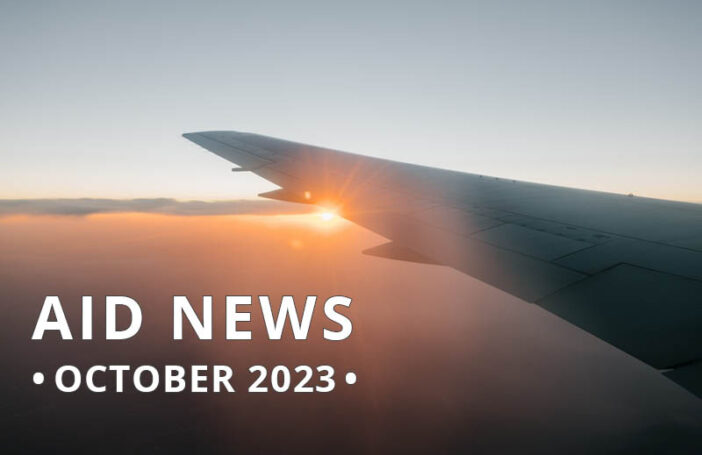Our monthly update of news and analysis on aid and international development, with a focus on Australian aid.
Australian aid
The twin disasters in Morocco and Libya have resulted in 7,000 confirmed deaths to date, injured thousands more and displaced tens of thousands of people. While Morocco has refused international assistance from some countries, international relief organisations are running humanitarian appeals for both disasters. The Australian government has provided only $1 million each to relief efforts in Morocco and Libya.
Speaking at a forum on the new development policy, the Minister for International Development and the Pacific, Pat Conroy, laid out three implementation challenges. Asked what the government would do less of, the minister identified “transactional” projects “in terms of helping HOMs [heads of mission] solve problems they had in the short term … [instead] I want long-term relationships with our development partners. I want the development part of DFAT to be driving excellence in everything it does.” The forum was critiqued on the Devpolicy Blog by Ben Day. The minister’s speech and Q&A and the subsequent panel discussions can be viewed on Devpol’s YouTube channel.
In Jakarta, Prime Minister Anthony Albanese announced a $150 million allocation under Australia’s $200 million climate partnership with Indonesia to mobilise private sector investment into Indonesia’s energy sector, provide technical assistance for climate policies, and help vulnerable groups adjust to the climate transition. In a subsequent visit to the Philippines, the Prime Minister announced $64 million over five years to support peacebuilding efforts in conflict-affected Mindanao.
Addressing the UN General Assembly, Foreign Minister Penny Wong highlighted the scale of climate change impacts in sub-Saharan Africa, the Caribbean and the Pacific and stalled progress on the Sustainable Development Goals (SDGs). Wong also endorsed the Bridgetown Initiative on development finance and echoed calls for reform of the multilateral development banks (MDBs).
Speaking on the sidelines of a meeting of Pacific foreign ministers earlier in the month, the Foreign Minister described an EU-style free movement regime in the Pacific as a “transformative approach to the region”, but observed that “there is a lot of work to do on how that would look, including between Pacific Island nations excluding Australia”.
Australia’s overall ranking has fallen to 17th (out of 40) on the Center for Global Development’s 2023 Commitment to Development Index. Australia ranked highly on trade (2nd), investment (6th) and health (7th) but scored poorly on environment (38th), finance (31st) and migration (27th). Australia falls to 25th overall when its ranking is adjusted for relative income.
Regional/global aid
At the 2023 US-Pacific Islands Forum Summit meeting in Washington DC, President Biden and Pacific leaders canvassed a raft of economic, security and development initiatives, including US$200 million in new US spending for the region. These initiatives are subject to legislative approval but the Congress remains deadlocked over Biden’s FY2024 budget, with a potential government shutdown looming. The Marshall Islands is also seeking further changes to its Compact of Free Association agreement with the US “to address the legacy of massive nuclear testing in the 1940s and 50s”. The current agreement expires on 30 September.
Korea has announced plans to boost its aid budget next year, to a record high of US$5.2 billion. If enacted, this would represent a 43% nominal increase and would see Korea surpass Australia on both aid volume and aid generosity (aid-to-GNI). Korea was one of only three OECD donor countries that ranked below Australia on the latter measure in 2022.
Indonesian President Joko Widodo and Chinese Premier Li Qiang were among those to take a test ride on the new high-speed rail between Jakarta and Bandung, a signature project under China’s Belt and Road Initiative (BRI) and one that has been affected by repeated cost overruns and delays.
With the BRI now in its tenth year, the BBC takes a look at the initiative’s mixed record in Cambodia.
G20 leaders, including Australia, have agreed to reforms to the MDBs that promise to deliver an additional US$200 billion in lending to help meet global development and climate goals. Many experts believe that, given the scale of financing gaps is in the trillions, the reforms will need to be accompanied by additional capital and concessional finance from donors.
An SDG summit held on the sidelines of the UN General Assembly confirmed that progress against many of the goals remains either off track or has gone backwards at their halfway point, and that “much more effort, investment and systemic change are required”.
The inaugural Africa Climate Summit ended with a call from the continent’s leaders for a global carbon tax to help raise climate funds. According to the summit’s Nairobi Declaration, this should include “a carbon tax on fossil-fuel trade, maritime transport and aviation, that may also be augmented by a global financial transaction tax”.
The UK has committed US$2 billion to the Green Climate Fund’s second replenishment, committing to “work closely with the GCF to accelerate the Fund’s delivery of improved access and greater impact, especially for those countries most vulnerable to climate change”. Experts from the Lowy Institute have argued that Australia should rejoin the GCF.
Books, papers, reports, podcasts etc.
Bridi Rice and Darren Lim discuss what Australia’s new development cooperation policy means to different stakeholders (including within DFAT) on the Australia in the World podcast.
Writing for the latest issue of the Development Cooperation Review, the UK-based One Campaign’s Director, David McNair, argues that a reimagined development finance architecture should include a common fund for humanitarian needs financed by a global emissions tax, reform of credit ratings and MDBs to support the clean energy infrastructure, and lowering the cost of migrant remittances to support social protection and development.
Daniel Handel, a former senior aid effectiveness advisor at USAID, unpacks the agency’s cash benchmarking initiative which aims to “make the case that a program shouldn’t be approved unless it is likely to do more good than taking the amount of money it planned to spend on behalf of beneficiaries and giving it directly to them”.
A new special investigation by Reuters exposes the horrors being inflicted on communities by Rapid Support Forces, a paramilitary organisation in Sudan, and explores the background to one of the world’s most brutal conflicts.





